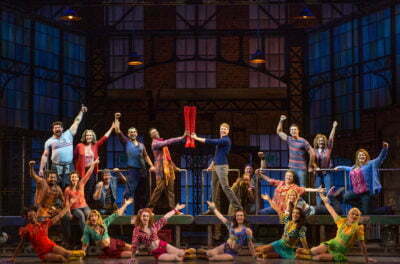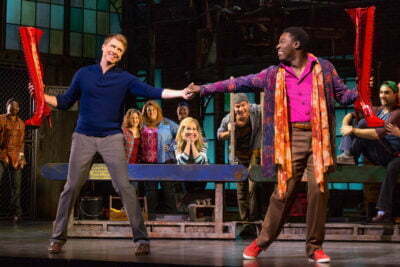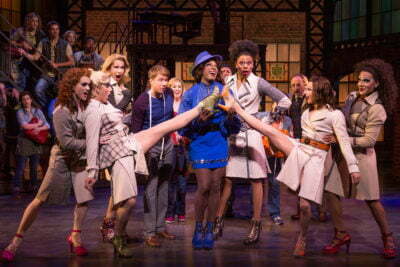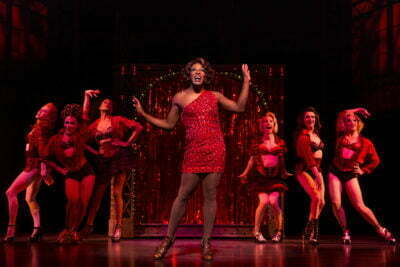Kinky Boots (National Tour)
Book by Harvey Fierstein
Music by Cindi Lauper
Directed and Choreographed by Jerry Mitchell
Produced by Broadway in Chicago
Light Fun from a Strong Production
When Kinky Boots debuted at Broadway in Chicago in 2012, many reviewers were of the opinion that it was competently staged and sung, but derivative. Now that it has returned after a Broadway run that won Tony Awards for best musical and best original score, that assessment remains true, although several people I talked to said that the production had improved from when they first saw it. But annoying though the book often is, Kinky Boots is a crowd-pleaser with lots of flashing lights, gyrating drag queens, and synthesizer disco ballads about loving yourself that raise the audience’s spirits and ensure a fun night out.

Charlie Price (Steven Booth) is the son of a shoe-making factory owner, whose fiancé, Nicola (Grace Stockdale) has taken him away with her to start a new life in London. She’s so determined to leave the small town of Clacton for a better life in real estate development, one of her first lyrics is “We’re upwardly mobile now!” Charlie never had much interest in shoes, and resists his father’s expectations to take over the family business. When his father dies unexpectedly, Charlie winds up with it anyway, and finds that the company’s finances are in much worse disarray than he’d thought, and their expensive, durable product cannot compete with cheap, shoddy EU imports. At this point, the book’s biggest problem, other than its unoriginality, emerges, when Charlie decides to find a way to keep the factory operating apparently just to spite Nicola and a childhood friend who is never seen again.
 Lauren (Lindsay Nicole Chambers), one of the workers Charlie had planned to lay off, suggests finding a niche market, and Charlie remembers a drag queen he attempted to rescue from assailants while in London. Lola (Kyle Taylor Parker), whose legal name is Simon, charmed Charlie with her outspokenness, cleverness, and caring heart, and complained that she had to pay high prices for female-style boots that fit her, but were still poorly made and often broke under her weight. When Lola asserts that a high percentage of men are cross-dressers, Charlie thinks he’s found his niche, and offers Lola a chance to be his designer. The two hope that exhibiting their new steel-reinforced boots for drag queens in Milan will solve both their problems, but first, there are issues of the workers’ homophobia, Charlie’s romantic entanglements with Niclola and Lauren, and Lola’s crises of confidence related to her own father to resolve.
Lauren (Lindsay Nicole Chambers), one of the workers Charlie had planned to lay off, suggests finding a niche market, and Charlie remembers a drag queen he attempted to rescue from assailants while in London. Lola (Kyle Taylor Parker), whose legal name is Simon, charmed Charlie with her outspokenness, cleverness, and caring heart, and complained that she had to pay high prices for female-style boots that fit her, but were still poorly made and often broke under her weight. When Lola asserts that a high percentage of men are cross-dressers, Charlie thinks he’s found his niche, and offers Lola a chance to be his designer. The two hope that exhibiting their new steel-reinforced boots for drag queens in Milan will solve both their problems, but first, there are issues of the workers’ homophobia, Charlie’s romantic entanglements with Niclola and Lauren, and Lola’s crises of confidence related to her own father to resolve.
 Steven Booth’s sweet, funny portrayal of Charlie is all the more remarkable for how often Charlie reverses his opinions out of scorn or insecurity (he later learns that his father didn’t really intend for him to run the company, and then commits all the more to something he didn’t want in the first place). He gets his share of Cyndi Lauper’s disco anthems, like “Step One” and “Soul of a Man,” which he performs with enthusiasm, but his role in the story is to contrast with Lola. Kyle Taylor Parker is charismatic and channels Lola’s vibrant sass in the cabaret song “Land of Lola,” which exists to demonstrate Lola’s magnetism, and does so quite effectively. With his back-up chorus of drag queens, his song “The Sex is in the Heel” roused the audience in Act One with its high energy and Jerry Mitchell’s acrobatic choreography, although the staging contradicts the discomfort Lola later feels in the presence of the workers and the scenes of her unhappy childhood. Booth and Parker dominate the show’s track list, but have eager support from both the drag queen and factory worker choruses. The only problem with most of the songs is that they’re a tad overlong, but I enjoyed the progression of Act One’s finale “Everybody Say Yeah,” from Charlie’s lonely musing to a celebration by the ensemble. It makes a lot more sense than Act Two’s finale, Raise You Up/Just Be,” by which point the book and direction have abandoned their story almost completely.
Steven Booth’s sweet, funny portrayal of Charlie is all the more remarkable for how often Charlie reverses his opinions out of scorn or insecurity (he later learns that his father didn’t really intend for him to run the company, and then commits all the more to something he didn’t want in the first place). He gets his share of Cyndi Lauper’s disco anthems, like “Step One” and “Soul of a Man,” which he performs with enthusiasm, but his role in the story is to contrast with Lola. Kyle Taylor Parker is charismatic and channels Lola’s vibrant sass in the cabaret song “Land of Lola,” which exists to demonstrate Lola’s magnetism, and does so quite effectively. With his back-up chorus of drag queens, his song “The Sex is in the Heel” roused the audience in Act One with its high energy and Jerry Mitchell’s acrobatic choreography, although the staging contradicts the discomfort Lola later feels in the presence of the workers and the scenes of her unhappy childhood. Booth and Parker dominate the show’s track list, but have eager support from both the drag queen and factory worker choruses. The only problem with most of the songs is that they’re a tad overlong, but I enjoyed the progression of Act One’s finale “Everybody Say Yeah,” from Charlie’s lonely musing to a celebration by the ensemble. It makes a lot more sense than Act Two’s finale, Raise You Up/Just Be,” by which point the book and direction have abandoned their story almost completely.
 Most people who are fans of Cyndi Lauper or Harvey Fierstein’s other delightful musicals, like La Cage aux Folles and Newsies, should have fun at Kinky Boots. That Fierstein drew so heavily from Billy Elliot, another musical adapted from a British movie, and The Full Monty, which are both about the working class’s struggle with queerness, is probably regarded by most audience members as giving them what they want. A large portion of the first part of the play feels mechanical; we all know what plot points have to be set up, but by the end of the show, its energy, positive message, and eye-popping costumes by Gregg Barnes and lighting by Kenneth Posner will have won most people over. At one point, Lola defends herself by saying she’s been hired to perform at a nursing home in Clacton, so how outrageous could she be, really? It’s a good point, though a strange one for a show that seems self-congratulatory for its preaching on acceptance. But celebration can be a good thing, and Charlie’s struggle to find his place in the world and take pride in (managing) a trade has as much potential for drama as a coming-out story.
Most people who are fans of Cyndi Lauper or Harvey Fierstein’s other delightful musicals, like La Cage aux Folles and Newsies, should have fun at Kinky Boots. That Fierstein drew so heavily from Billy Elliot, another musical adapted from a British movie, and The Full Monty, which are both about the working class’s struggle with queerness, is probably regarded by most audience members as giving them what they want. A large portion of the first part of the play feels mechanical; we all know what plot points have to be set up, but by the end of the show, its energy, positive message, and eye-popping costumes by Gregg Barnes and lighting by Kenneth Posner will have won most people over. At one point, Lola defends herself by saying she’s been hired to perform at a nursing home in Clacton, so how outrageous could she be, really? It’s a good point, though a strange one for a show that seems self-congratulatory for its preaching on acceptance. But celebration can be a good thing, and Charlie’s struggle to find his place in the world and take pride in (managing) a trade has as much potential for drama as a coming-out story.
Recommended
Jacob Davis
[email protected]
Reviewed July 8, 2015
For more information, see Kinky Boots’ page on Theatre in Chicago.
Playing at the Cadillac Palace Theatre, 151 W Randolph, Chicago. Tickets are $25-108. To order, call 800-775-2000 or visit BroadwayinChicago.com. Playing through July 26. Running time is two hours and twenty minutes, with one intermission.
